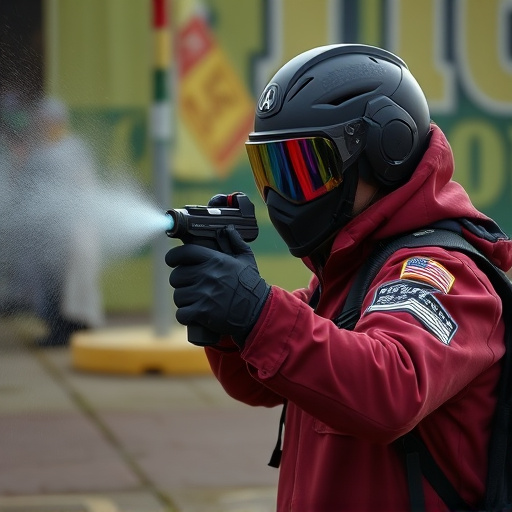Pepper spray, composed of oleoresin capsicum (OC) and capsaicin, temporarily incapacitates assailants by causing vision impairment and pain, enabling users to escape. Despite myths, it does not cause permanent blindness but impairs vision for several minutes. As a non-lethal deterrent, pepper spray provides crucial time for escape or defense, with temporary effects that subside as the body metabolizes capsaicin. Its legal use is restricted to self-defense or law enforcement and varies by region; proper training in application techniques and understanding local regulations are essential for safe and effective deployment, avoiding legal repercussions and preventing accidental harm.
“Discover the power and pitfalls of pepper spray as a deterrent in personal defense. This comprehensive guide explores how this non-lethal weapon works, its effectiveness as a deterrent against potential threats, and the science behind its burning sensation. We debunk common myths about blinding capabilities, offering insights into its limitations. Furthermore, understand the legal considerations and strategic use cases of pepper spray to ensure responsible and effective self-protection.”
- Understanding Pepper Spray: What It Is and How It Works
- The Mechanism of Pepper Spray as a Deterrent
- Can Pepper Spray Blind You? Debunking Myths and Misconceptions
- Legal Implications and Effective Use Strategies
Understanding Pepper Spray: What It Is and How It Works
Pepper spray, also known as oleoresin capsicum (OC) spray, is a non-lethal self-defense tool designed to temporarily incapacitate an assailant by causing discomfort and pain. It’s a liquid or aerosol compound derived from chili peppers, packed with capsaicin—the chemical responsible for the spicy sensation you feel when eating hot food. When sprayed, capsaicin irritates the eyes, nose, mouth, and skin, leading to tears, coughing, difficulty breathing, and temporary blindness.
While pepper spray is an effective deterrent, it’s crucial to understand its limitations. Unlike common myths, pepper spray does not cause permanent blindness; rather, it can temporarily impair vision for several minutes, providing users with a vital escape window. The effects are designed to be disruptive enough to allow the user to get away from a dangerous situation but not severe enough to cause permanent harm.
The Mechanism of Pepper Spray as a Deterrent
Pepper spray operates by leveraging a complex chemical mechanism to deter and disable attackers. At its core, pepper spray contains capsaicin, the same compound that gives chili peppers their heat. When deployed, this chemical irritates the eyes, nose, and throat of the target, leading to temporary blindness and severe discomfort. The immediate reaction is a strong urge to blink repeatedly, which can cause tears to form, further exacerbating visibility issues. This disruption in visual and respiratory functions provides the user with crucial time to escape or defend themselves.
Unlike some deterrents that rely on physical force or noise, pepper spray takes advantage of non-lethal chemical agents to disrupt an attacker’s ability to continue the assault. It’s important to note that while pepper spray can blind you momentarily, its effects are designed to be temporary and reversible. The impact subsides as the body metabolizes the capsaicin, allowing individuals to regain their senses after a few minutes. This swift yet non-permanent nature makes pepper spray a popular choice for self-defense mechanisms in various scenarios.
Can Pepper Spray Blind You? Debunking Myths and Misconceptions
Many people believe that pepper spray can blind its target, but this is a common misconception. While it’s true that pepper spray causes severe irritation and temporary blindness, it doesn’t actually blind someone permanently or even for an extended period. The effect is similar to that of tearing up from a strong irritant—it’s intense but fleeting. Most individuals will recover their vision within a few minutes after exposure.
This myth may have originated from exaggerated claims or misinformed narratives, but the reality is that pepper spray is designed as a non-lethal self-defense mechanism. It disrupts vision by causing the eyes to water and provides a crucial moment for the user to escape or de-escalate a situation. Understanding the truth behind this misconception can help individuals make informed decisions about personal safety and the effectiveness of pepper spray as a deterrent.
Legal Implications and Effective Use Strategies
Pepper spray, while often portrayed as an effective deterrent and defense mechanism, comes with a host of legal implications that must be considered. The use of pepper spray is governed by stringent laws, varying significantly from one jurisdiction to another. In many regions, it’s only legal for self-defense or in the hands of law enforcement. Improper or excessive use can lead to severe consequences, including charges of assault or battery. It’s crucial to understand local legislation before carrying pepper spray, as doing so without proper authorization can result in penalties, including fines and imprisonment.
To ensure effective use, it’s vital to undergo proper training. Pepper spray is designed to temporarily incapacitate an assailant by causing a burning sensation, tears, and difficulty breathing. However, its effectiveness depends on correct application—spraying at close range into the face or eyes. Misting pepper spray too far away or not aiming correctly might not neutralize the threat. Training sessions should cover not only the physical use of the spray but also strategic deployment to avoid accidental injuries, especially when in close quarters. Remember, understanding legal boundaries and mastering application techniques are key to utilizing pepper spray responsibly and effectively.
Pepper spray, while often hailed as a powerful deterrent, should be used responsibly. It’s crucial to understand its mechanism and limitations, particularly addressing the common misconception that it can blind permanently. Unlike popular belief, blindness is rare and temporary when using pepper spray correctly. Knowing the legal implications and implementing effective use strategies ensures this defense mechanism remains a safe and effective option for personal protection.
